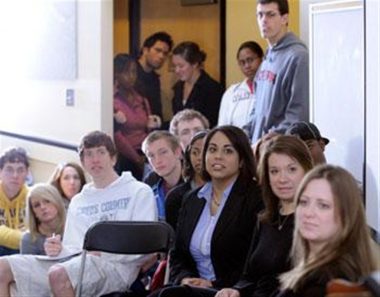
Four Communications alumni participated in a paneldiscussion Monday afternoon, reflecting on how their Elonexperiences helped them gain a foothold in the mediaindustry.
The panelists—Kim Hayes, a 2005 cinema major, JasonDennis, a 1998 broadcast major, Allison Deiboldt, a 2002corporate communications major, and Samiha Khanna, a 2003journalism major— impressed upon the standing-room onlycrowd of assembled students the importance of becomingheavily involved in Elon student and media organizations andthe significance of being able to work competently andcomfortably across media platforms.
“Some of the things I did here through theCommunications school really prepared me for my day-to-dayresponsibilities,” said Khanna, who works as a staffreporter out of the Raleigh News & Observer’sDurham bureau. “The important thing to remember is thatyou can try anything you want, and you really have nothing tolose. You have everything at your fingertips on this campus.You have incredible access at this school.”
Khanna and the other panelists all touted Elon’semphasis on engaged learning and the many opportunities theywere afforded outside the classroom, whether they werewriting for The Pendulum or producing their own shows forESTV.
“Take advantage of this now,” said Dennis, theanchor of the 10 p.m. news on WXTX in Columbus, Ga.“Elon is an amazing, amazing school. Don’t takefor granted what you get here.”
They all discussed the value of internships, where studentscan gain invaluable experience in their field and beyond.Khanna, for example, did an internship at CNN early in hercollege career, despite her being a journalism major.
“It wasn’t going to be just about writing fornewspapers,” said Khanna, who has worked for the News& Observer for four years. “I knew I had to haveother skills. The longer I’ve been in this business,the more I’ve seen those lines are blurring between thedifferent media. All the (skills) you gather here will beimportant in whatever field you go into.”
Deiboldt’s career has certainly combined traditionalmedia (print, radio) with new media (Internet); although,she’s taken a circuitous route to her job.
 Deiboldt answered phones and worked at a gymbefore finally moving to New York, where she initially livedwith her brother in Queens. She circulated her resume to anumber of businesses and agencies, but it was an obscureconnection she had that led her to her currentposition.
Deiboldt answered phones and worked at a gymbefore finally moving to New York, where she initially livedwith her brother in Queens. She circulated her resume to anumber of businesses and agencies, but it was an obscureconnection she had that led her to her currentposition.
Deiboldt landed her job at Disney Media, where she hasworked for four years in advertising sales and marketing forDisney’s radio, television, online and print products,because of the daughter of one of her father’sco-workers. The connection was unusual at the time, and shenow lauds the virtues of honing networking skills.
“I agree … that it’s all about who youknow,” Deiboldt said. “Sometimes it’s allabout who they know.”
Dennis said networking is the No. 1 piece of advice he givesto students and prospective broadcasters.
“The most important thing I tell people is it’swho you know,” said Dennis, who was reporting for abroadcast news program one week after graduation. “Youcan be talented and look good, but it probably won’ttake you very far. It’s all about who youknow.”
Hayes, meanwhile, didn’t have too many connectionswhen she graduated from Elon and moved to Las Vegas with herparents. Her initial plan was to live with her parents untilshe could find a job in Los Angeles.
She began sending a cover letter and resume to everyproduction studio and company in Las Vegas, and threeresponded to her. She landed a job with Big Picture Studios,where she performs a myriad of tasks, including preparingcall times, managing budgets, producing shoots and editingvideos.
“Big Picture Studios is such a small, independentcompany that I was able to advance very quickly,” Hayessaid. “Because I knew the software programs, I was ableto get assignments quickly.”
And Hayes, like her three counterparts, still loves her jobto this day, an asset they couldn’t stress enough tothe students. Monetary gain is secondary, they said. Instead,graduates should take absolute care in finding a job thatthey will be passionate about.
“The best part of my job is that every day isdifferent,” Khanna said. “The worst part of myjob is that every day is different. But I’m excited towake up every morning. I’m one of the few people in mylife who is doing what they truly love. You shouldn’twaste time doing something you’re not passionateabout.”
– Article written by Colin Donohue, coordinator of student media


